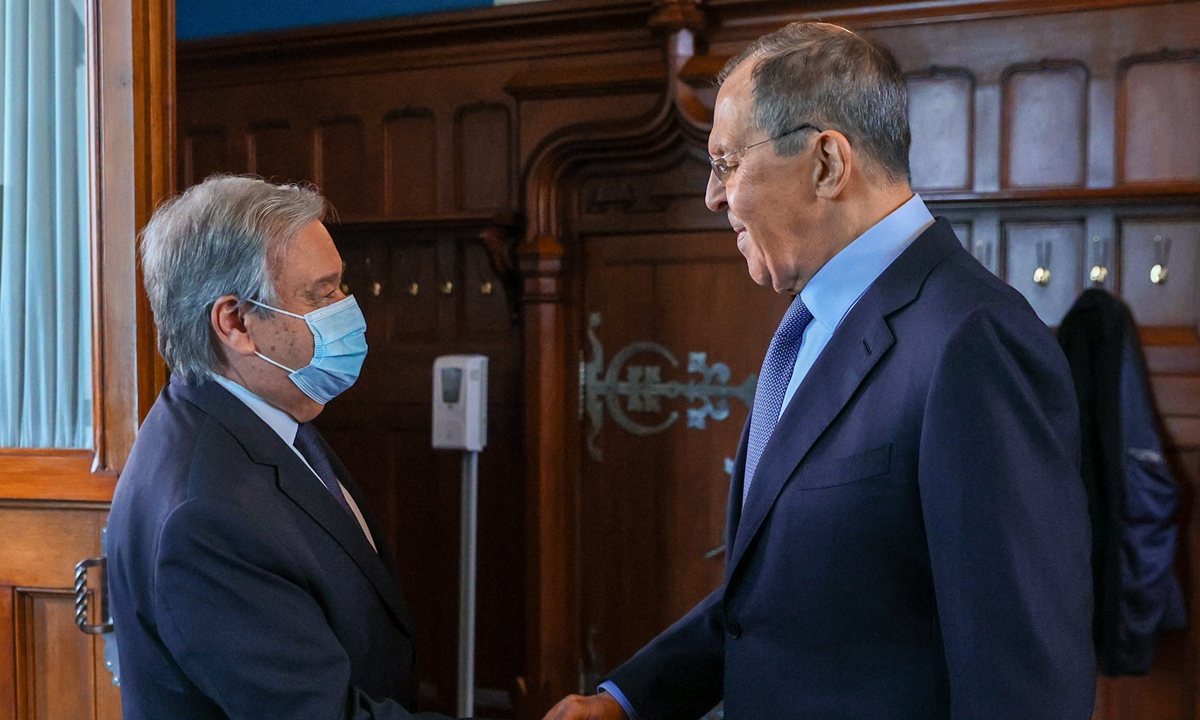
Russian Foreign Minister Sergey Lavrov (right) meets United Nations Secretary-General Antonio Guterres in Moscow, Russia, on April 26, 2021. Photo:AFP
Defense chiefs of the US and other Western countries met at the Ramstein Air Base in Germany on Tuesday to discuss further military aid to Ukraine, two days after US pledges of more military aid to Kiev. Yet Chinese observers cautioned that the West has gone increasingly high-profile in arming Ukraine although Russia has warned of the possibility of "nuclear conflict" and risks of a "third world war."
Russian Foreign Minister Sergey Lavrov, during a TV interview on Monday, warned the risks of nuclear conflict were "considerable" and the conflict in Ukraine "risked escalating into a third world war."
Chinese Ministry of Foreign Affairs spokesperson Wang Wenbin, when asked to comment on such remarks at Tuesday's routine press briefing, urged all stakeholders to act with restraint and prevent the situation from escalating, to avoid bigger costs for Europe and the world.
All parties must first support dialogue and negotiation to prevent the conflict from expanding and going protracted, Wang said. It requires reflections on why Europe has fallen back into the whirlpool of geopolitical conflicts more than 30 years after the end of the Cold War, how to build a balanced, effective and sustainable European security architecture, and how to strengthen the global security governance system.
In the interview, Lavrov said NATO is "in essence" engaged in a war with Russia through a proxy and is arming that proxy.
US State Secretary Antony Blinken and Defense Secretary Lloyd Austin on Sunday visited Kiev and told Ukrainian President Volodomyr Zelensky the US would provide more than $300 million in military financing and had approved a $165 million sale of ammunition.
The Tuesday talks in Germany, which reportedly included some 40 NATO and non-NATO countries, aimed to synchronize and coordinate security assistance to Kiev that includes heavy weaponry, like howitzer artillery and well-armed drones and ammunition, according to US Joint Chiefs of Staff Chairman General Mark Milley.
Zhang Hong, an Eastern European studies expert from the Chinese Academy of Social Sciences, said Russia is facing increasing Western pressure, from piling-up economic sanctions and political attacks to direct military supplies to Ukraine.
Roughly after the "Bucha incident," Europe has leaned unanimously toward Ukraine and provided more weapons to Kiev, which enabled Ukraine to reach a relative balance in military strength with Russia, Zhang said.
Russia has concentrated its forces in Donbas, yet the battlefield is now in a stalemate, a situation that Russia does not want to see.
Ukraine wants to drag Russia into a protracted war and consume Russia's economic and military strength, in the hope that the latter will ultimately withdraw its troops, Zhang said.
But the West arming Ukraine to sustain a protracted war with Russia could cause unimaginable consequences, Zhang said. "The chance of Russia using nuclear weapons always exists, but has been increasing in a dangerous manner."
Song Zhongping, a Chinese military expert and commentator, saw Lavrov's remarks as "a warning" to NATO to stop involving itself in the conflict deeper and deeper.
The US has made Ukraine a de facto NATO member, as there have never been a particular member of NATO that received so much support from the US and other alliance members as Ukraine did, especially in terms of military equipment, Song said.
In sending weapons to support Ukraine fight Russia, Song believed Article 5 of the military alliance has already been activated in practice.
Sweden and Finland, which has 1,300-kilometer borders with Russia, have agreed to submit simultaneous membership applications to NATO as early as mid-May, media reported.
Given all those signals, Russia is "prepared for the worst" - as Russian Foreign Minister Sergey Lavrov warned - "a real danger of a third world war," which will have no winners, Song noted.
The US does not want to see the conflict be solved soon through negotiations and Lavrov said "The real position of Ukraine is determined in Washington, London and other Western capitals."
Russia has made it clear it cannot lose. If both sides maintain the toughness, the battlefield could be the entire Europe, causing huge disasters to all those European countries and the whole world, Song warned.
Also on Tuesday, United Nations Secretary-General Antonio Guterres embarked on a three-day trip to Moscow in order to address humanitarian problems and revitalize the UN's role in the conflict.
"Guterres will try to provide a new momentum for the UN to play a role for humanitarian access in the evacuation of civilians, especially from Mariupol, and in a broader context to allow better access of UN and other humanitarian agencies to the conflict zones," said Jean-Marc Rickli, head of Global and Emerging Risks at the Geneva Centre for Security Policy.
But observers reached by the Global Times saw little chance that UN chief's visit may make a difference amid US and NATO's fanning of flames. US demands are completely unacceptable for Russia and room for negotiation is basically closed at the point, they said.




